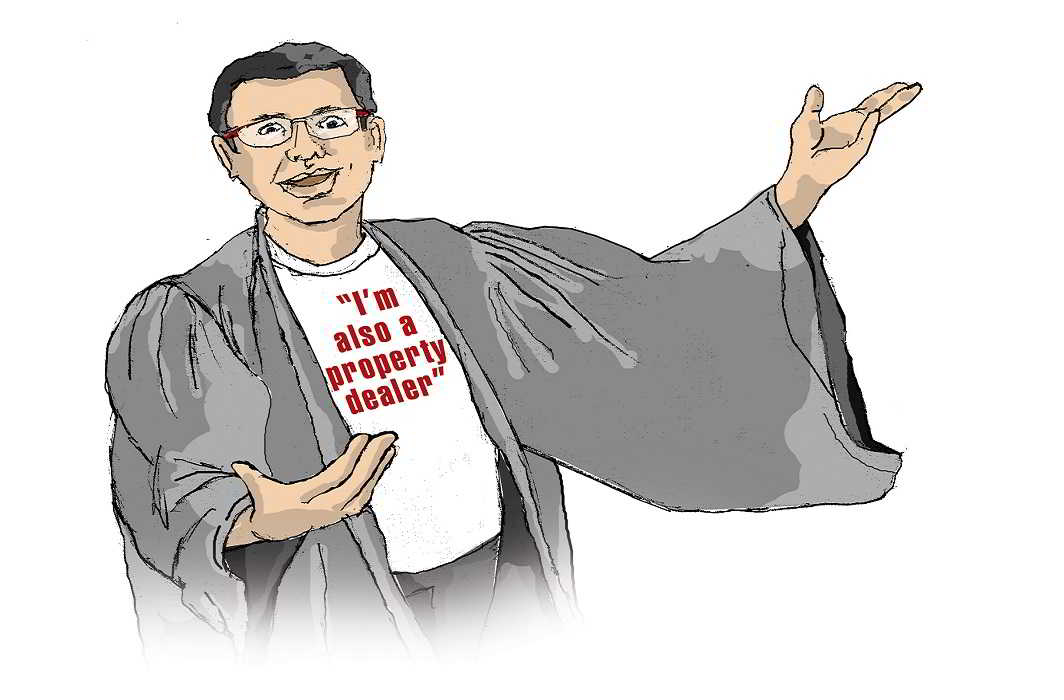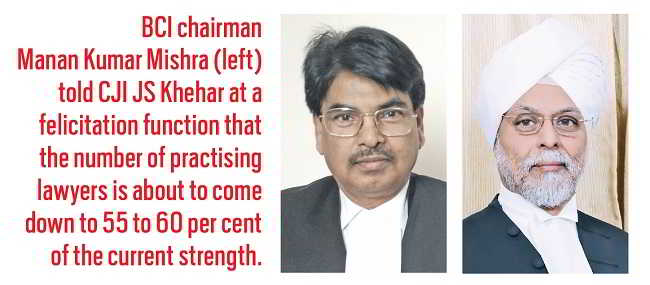The Bar Council of India’s exercise to identify unregistered advocates is riddled with several hurdles, making it a long-winded and cumbersome process
~By Venkatasubramanian
When the Bar Council of India (BCI) notified on January 13, 2015 its new Certificate and Place of Practice (Verification) Rules, it provided credible justification for doing so. The BCI led many stake-holders to believe that it could achieve its objective to weed out fake lawyers in the country through a verification drive across the country.
Two years later, its process of verification is continuing. But the Council is yet to come out with any precise data about the exact number of fake lawyers in the legal profession. Nor has it been able to weed out even a single such lawyer from the rolls of the state bar councils.
The verification exercise is daunting, not only because of its sheer scale and size but also because the BCI has linked the process with its obligation to hold periodical elections to the governing bodies of bar councils of the states. So there is also the additional challenge of ensuring democratic accountability.

On January 23 this year, the BCI Chairman, Manan Kumar Mishra, told the Chief Justice of India, Justice JS Khehar at a felicitation function that the number of practising lawyers is about to come down to 55 to 60 per cent of the current strength, after the completion of the verification process. According to some estimates, there are around two million lawyers in the country.
Clearly, this is an extravagant claim, and unless backed by precise data, would remain nothing more than that.
THE CHALLENGES
The yardstick for verification is to weed out those who are not members of the bar councils or bar associations. Lawyers who are not members of bar associations, however, were aggrieved and sought a stay of the notification. However, the Supreme Court bench comprising justices Pinaki Chandra Ghose and RK Agrawal, on November 2, 2015, found it unnecessary to stay it.
The Supreme Court’s reluctance was due to the fact that the new rules had laudable objectives. The BCI proclaimed: “An independent and fearless Bar is vital and crucial for sustaining and promoting a true and healthy democracy. The Bar which is subject to manipulation and influence from extraneous powers, howsoever mighty and esteemed they may be, cannot do justice either to the legal profession or to the rule of law. Bench and Bar are the two wheels of a chariot and one cannot function without the other. Sadly, this profession has fallen under a cloud.”
The concern over fake lawyers within the BCI emerged after a joint meeting of the representatives of state bar councils and BCI. What contributed to this concern is strangely the trend of advocates switching over to other professions, services and businesses without informing the bar councils.
This trend, the BCI noted, has reached alarming proportions, and is endangering the legal profession as a whole. “It has also made a dent in its sanctity and standards. Names of such advocates continue to be included in the ‘Roll of advocates’ being maintained by the State Bar Councils, notwithstanding the fact that they have left the legal profession or have since died”, the BCI observed in its Statement of Objects and Reasons for the new rules.
ALARMING LAPSES
Though under Section 19 of the Advocates Act, the state bar councils are under legal obligation to send a copy of the roll of advocates prepared by it under Section 17 of the Act and subsequent alterations/additions thereto, no state bar council has observed this mandatory provision of the Act.
The BCI claimed that it noticed a definite trend that the control of bar associations and other elected bodies under the Advocates Act is slipping out of the hands of the advocates who practice law. The BCI also admitted that after certificate of enrolment is issued to an advocate, there’s practically no communicative and continuing contact surviving between him/her and the council. Thus it is not wrong enrolment of a person as a lawyer but the subsequent migration of those enrolled to other professions going undetected which has triggered this verification.
But the question is, whether it is a strong enough justification for doing away with elected bodies, and extending their terms beyond their expiry. State bar councils whose terms have expired include Delhi, Assam, Goa, Rajasthan, Uttarakhand, Bihar, Maharashtra, and West Bengal.
 KR Chitra, advocate, who has been fighting for reform of these bodies, claims that the new rules impose unreasonable restrictions on the right of advocates to carry on their legal practice. There are other serious legal challenges.
KR Chitra, advocate, who has been fighting for reform of these bodies, claims that the new rules impose unreasonable restrictions on the right of advocates to carry on their legal practice. There are other serious legal challenges.
The BCI and all state bar councils are taking advantage of their own historical wrongs of omitting to verify and satisfy the genuineness of law degrees, before enrolling advocates, Chitra alleges. “The advantage can be seen in their illegal extension of their expired terms, under the pretext that fresh elections cannot be held, unless all fake lawyers are weeded out,” she told India Legal.
VERIFICATION AND ELECTIONS
Verification, she insists, should be a continuous affair, and must be prospective, so that it is not a hindrance to holding periodical elections to the representative bodies of lawyers.
The BCI also found to its dismay that various welfare schemes for advocates have been floated by the state legislations and by the state bar councils and the BCI, but their benefits are being enjoyed by those who have left the profession.
The BCI also claimed that it has come to know that a number of fake (farzi) persons (without any law degree or enrolment certificate) are indulging in legal practice and are cheating the litigants, courts and other stake-holders; and neither the bar associations nor the concerned state bar councils have any control over such persons. But it has not disclosed how it got this information.
Shockingly, the BCI claimed that it has come to its notice that at some places, the office-bearers of bar associations or some vote-seekers knowingly make such people members and voters of their associations with a motive to get their votes in the elections of bar associations or bar councils, even though many of them have subsequently migrated to other professions.
The BCI has described those opposed to reformative steps as vested interests, and has proposed harsh measures against them, including disqualification from contesting any association or council elections for a period of three years from the date of order to this effect.
As the verification case comes up for review in the Supreme Court, the BCI faces an acid test to vindicate its professed claims regarding its radical steps to weed out fake lawyers. It can do so only by releasing hard data with regard to the number and identity of fake lawyers, and those who migrated to other professions, without getting their names deleted from the rolls of the state bar councils.


